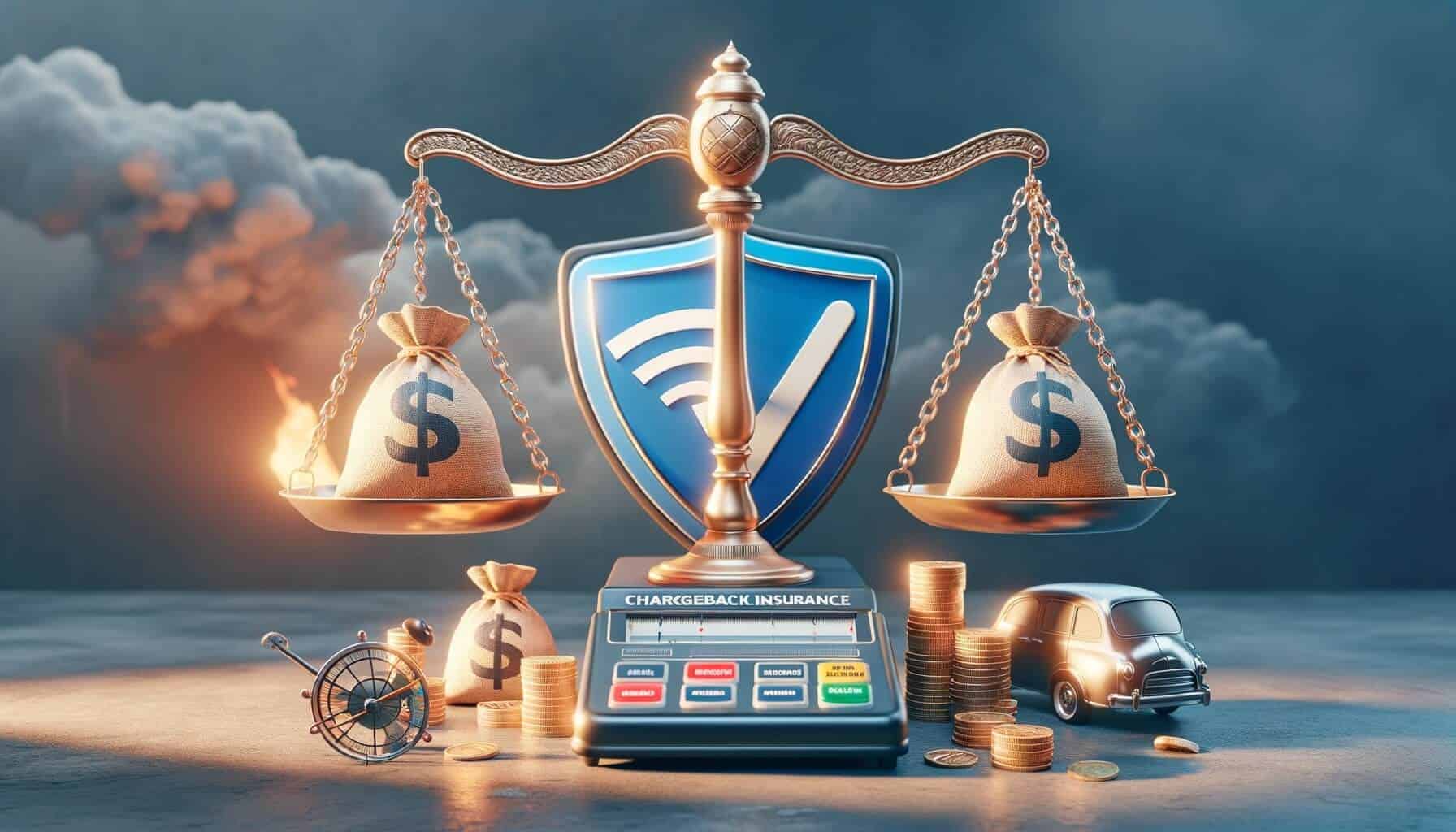
By admin March 11, 2025
As a merchant, one of the biggest challenges you may face is dealing with chargebacks. Chargebacks occur when a customer disputes a transaction and requests a refund from their bank or credit card company. While chargebacks are a necessary consumer protection mechanism, they can be a major headache for merchants. Not only do chargebacks result in lost revenue, but they can also lead to additional fees and penalties imposed by payment processors.
To mitigate the financial impact of chargebacks, many merchants are turning to chargeback insurance. Chargeback insurance is a type of coverage that protects merchants from the financial losses associated with chargebacks.
In this comprehensive guide, we will explore the basics of chargebacks, the importance of chargeback prevention strategies, the benefits of chargeback insurance, how to choose the right provider, and a step-by-step guide to obtaining chargeback insurance. We will also provide tips for effectively managing chargebacks with insurance and address common FAQs about chargeback insurance for merchants.
Understanding the Basics of Chargebacks
Before delving into the benefits of chargeback insurance, it is important to understand the basics of chargebacks. A chargeback occurs when a customer disputes a transaction and asks their bank or credit card company to reverse the payment. Chargebacks can be initiated for various reasons, including fraud, dissatisfaction with the product or service, or unauthorized use of the customer’s card.
When a chargeback is initiated, the merchant is required to provide evidence to prove that the transaction was legitimate and that the customer received the product or service as promised. If the merchant fails to provide sufficient evidence, the chargeback is typically approved, and the merchant is liable for the refunded amount, as well as any associated fees.
Chargebacks can have a significant impact on a merchant’s bottom line. According to a report by Juniper Research, chargebacks are expected to cost merchants $25 billion by 2020. Additionally, chargebacks can damage a merchant’s reputation and lead to increased scrutiny from payment processors, which may result in higher fees or even the termination of the merchant’s account.
The Importance of Chargeback Prevention Strategies

While chargebacks are an inevitable part of doing business, implementing effective chargeback prevention strategies can help minimize their occurrence. By proactively addressing the root causes of chargebacks, merchants can reduce their financial losses and maintain a positive relationship with their customers.
One of the most effective chargeback prevention strategies is to provide clear and accurate product descriptions. Customers are more likely to dispute a transaction if they feel misled or if the product they receive does not match the description provided by the merchant. By ensuring that product descriptions are accurate and detailed, merchants can reduce the likelihood of chargebacks due to customer dissatisfaction.
Another important chargeback prevention strategy is to provide excellent customer service. By promptly addressing customer concerns and resolving any issues that arise, merchants can prevent customers from resorting to chargebacks as a means of seeking resolution. Additionally, merchants should have a clear and accessible refund policy to provide customers with an alternative to initiating a chargeback.
Exploring the Benefits of Chargeback Insurance

While chargeback prevention strategies are crucial, they cannot completely eliminate the risk of chargebacks. This is where chargeback insurance comes into play. Chargeback insurance provides merchants with financial protection against chargebacks, helping to minimize the impact on their bottom line.
One of the key benefits of chargeback insurance is that it covers the cost of chargebacks, including the refunded amount and any associated fees. This can provide merchants with peace of mind, knowing that they are protected from the financial losses associated with chargebacks.
Chargeback insurance also offers additional benefits beyond financial protection. Many chargeback insurance providers offer access to chargeback management tools and resources, which can help merchants identify and address the root causes of chargebacks. By analyzing chargeback data and implementing proactive measures, merchants can reduce the occurrence of chargebacks and improve their overall business operations.
How to Choose the Right Chargeback Insurance Provider

Choosing the right chargeback insurance provider is crucial to ensure that you receive the best coverage and support for your business. When selecting a chargeback-insurance provider, there are several factors to consider.
First and foremost, it is important to assess the provider’s reputation and track record. Look for a provider that has a proven history of successfully handling chargebacks and providing excellent customer service. Reading reviews and testimonials from other merchants can provide valuable insights into the provider’s reliability and effectiveness.
Additionally, consider the specific needs of your business when evaluating chargeback insurance providers. Some providers specialize in certain industries or types of transactions, so it is important to choose a provider that understands the unique challenges and risks associated with your business.
Another important factor to consider is the cost of the chargeback-insurance coverage. While it is important to find a provider that offers competitive rates, it is equally important to ensure that the coverage provided is comprehensive and meets your specific needs. Be sure to carefully review the terms and conditions of the insurance policy to understand what is covered and any limitations or exclusions that may apply.
A Step-by-Step Guide to Obtaining Chargeback Insurance
Obtaining chargeback insurance involves several steps to ensure that you receive the right coverage for your business. Follow this step-by-step guide to navigate the process effectively:
1. Assess your chargeback risk: Before seeking chargeback-insurance, evaluate your business’s chargeback risk by analyzing historical chargeback data and identifying any patterns or trends.
2. Research chargeback insurance providers: Conduct thorough research to identify reputable chargeback insurance providers that offer coverage suitable for your business.
3. Request quotes: Contact the selected chargeback insurance providers and request quotes based on your business’s specific needs and chargeback risk.
4. Compare coverage and costs: Review the quotes received from different providers, comparing the coverage offered, costs, and any additional benefits or services provided.
5. Evaluate terms and conditions: Carefully review the terms and conditions of the insurance policies to understand the coverage, limitations, exclusions, and any additional requirements or obligations.
6. Seek professional advice if needed: If you are unsure about any aspect of the chargeback insurance policies, consider seeking advice from a legal or financial professional to ensure that you make an informed decision.
7. Select a provider and purchase coverage: Once you have evaluated the options and made a decision, contact the chosen chargeback insurance provider to finalize the purchase of the coverage.
8. Implement chargeback prevention strategies: While chargeback insurance provides financial protection, it is important to continue implementing effective chargeback prevention strategies to minimize the occurrence of chargebacks.
Tips for Effectively Managing Chargebacks with Insurance
While chargeback insurance provides financial protection, it is important to effectively manage chargebacks to minimize their occurrence and maximize the benefits of the insurance coverage. Here are some tips to help you manage chargebacks effectively:
1. Monitor chargeback trends: Regularly review and analyze chargeback data to identify any patterns or trends. This can help you identify areas for improvement and implement proactive measures to reduce chargebacks.
2. Implement fraud prevention measures: Fraudulent chargebacks can be particularly damaging to merchants. Implement robust fraud prevention measures, such as address verification systems and card security codes, to minimize the risk of fraudulent chargebacks.
3. Provide excellent customer service: Promptly address customer concerns and resolve any issues that arise. By providing excellent customer service, you can prevent customers from resorting to chargebacks as a means of seeking resolution.
4. Maintain accurate records: Keep detailed records of all transactions, including order confirmations, shipping information, and customer communication. These records can serve as valuable evidence in the event of a chargeback dispute.
5. Respond to chargebacks promptly: When a chargeback is initiated, respond promptly and provide all necessary evidence to support your case. Failure to respond in a timely manner can result in the chargeback being automatically approved.
6. Utilize chargeback management tools: Many chargeback insurance providers offer access to chargeback management tools and resources. Take advantage of these tools to streamline the chargeback management process and identify areas for improvement.
Common FAQs About Chargeback Insurance for Merchants
Q: What is chargeback insurance?
A: Chargeback insurance is a type of coverage that protects merchants from the financial losses associated with chargebacks. It covers the cost of chargebacks, including the refunded amount and any associated fees.
Q: How does chargeback insurance work?
A: When a chargeback is initiated, the merchant submits a claim to their chargeback insurance provider. The provider reviews the claim and, if approved, reimburses the merchant for the refunded amount and any associated fees.
Q: What does chargeback insurance cover?
A: Chargeback insurance typically covers the cost of chargebacks, including the refunded amount and any associated fees. Some providers may also offer additional benefits, such as access to chargeback management tools and resources.
Q: How much does chargeback insurance cost?
A: The cost of chargeback insurance varies depending on factors such as the merchant’s industry, transaction volume, and chargeback risk. Merchants should obtain quotes from multiple providers to compare costs and coverage.
Q: Is chargeback insurance worth it?
A: Chargeback insurance can be a valuable investment for merchants, particularly those in high-risk industries or with a history of chargebacks. It provides financial protection and access to resources that can help reduce chargebacks.
Conclusion
Chargebacks can be a significant challenge for merchants, resulting in lost revenue, additional fees, and damage to their reputation. However, by implementing effective chargeback prevention strategies and obtaining chargeback insurance, merchants can mitigate the financial impact of chargebacks and protect their bottom line.
Chargeback insurance provides merchants with financial protection by covering the cost of chargebacks, including the refunded amount and any associated fees. Additionally, many chargeback insurance providers offer access to chargeback management tools and resources, helping merchants identify and address the root causes of chargebacks.
When choosing a chargeback insurance provider, merchants should consider factors such as the provider’s reputation, industry specialization, coverage and costs, and terms and conditions. By carefully evaluating the options and following a step-by-step guide to obtaining chargeback insurance, merchants can ensure that they receive the best coverage and support for their business.
Managing chargebacks effectively involves monitoring chargeback trends, implementing fraud prevention measures, providing excellent customer service, maintaining accurate records, responding to chargebacks promptly, and utilizing chargeback management tools. By combining chargeback insurance with proactive chargeback prevention strategies, merchants can minimize the occurrence of chargebacks and maximize the benefits of the insurance coverage.
In conclusion, chargeback insurance is a valuable tool for merchants to protect their business from the financial losses associated with chargebacks. By understanding the basics of chargebacks, implementing effective chargeback prevention strategies, choosing the right chargeback insurance provider, and managing chargebacks effectively, merchants can navigate the complex world of chargebacks with confidence and peace of mind.